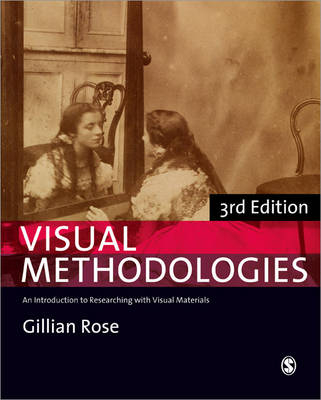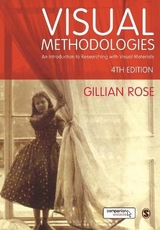
Visual Methodologies
SAGE Publications Ltd (Verlag)
978-0-85702-888-4 (ISBN)
- Titel erscheint in neuer Auflage
- Artikel merken
"If you need to carry out research into visuals then Rose′s book provides straight forward practical assistance for how to do so... She explains clearly how we can deal with the visual from diverse approaches such as content analysis, semiotics, psychoanalysis and discourse analysis, all explained carefully, using examples, in terms of the stages of a research project."
- David Machin, Cardiff University
"The authoritative introductory text on the methods of visual research. Conveying the richness and excitement of visual culture research, Rose expertly navigates across a range of methodologies, explaining in detail their particular usefulness and limitations through practical examples."
- Julie Doyle, University of Brighton
"A welcome overview of the state of the field. Visual Methodologies succeeds both as an introductory text, certain to be widely adopted in the classroom, and as a sophisticated refresher course for those who have followed the rapid maturation of this remarkable interdisciplinary discourse
- Martin Jay, University of California, Berkeley
With over 25,000 copies sold worldwide, Gillian Rose′s book is the bestselling critical introduction to the study and analysis of visual culture.
Each chapter provides a rigorous examination and demonstration of an individual methodology, with case studies, colour images, suggested further reading and visual examples throughout.
Reflecting changes in the way society consumes and creates its visual content, the updated Third Edition includes:
A companion website featuring additional examples of digital media, social media, and moving images. Visit www.sagepub.co.uk/rose
An additional chapter and expanded coverage on social and new media, and more information on the mass media in general (TV, print and broadcasting)
An expanded focus on how each method can be used in relation to a range of different visual materials
A new chapter on how to use visual materials for research and the presentation of research findings.
A now classic text, the book will be used by undergraduates, postgraduates, researchers and academics looking to understand and clearly grasp the complex debates and ideas in visual analysis and interpretation.
My research interests lie broadly within the field of visual culture. I′m interested in visuality as a kind of practice, done by human subjects in collaboration with different kinds of objects and technologies. One long-term project, which resulted in a book from Ashgate Press in 2010, looked at family photos. I approached family snaps by thinking of them as objects embedded in a wide range of practices. I interviewed women with young children about their photos, and also looked at the politics and ethics of family snaps moving into more public arenas of display when the people they picture are the victims of violence. The book explores the different ′politics of sentiment′ in which family snaps participate in both their domestic spaces in the public space of the contemporary mass media. Other work is extending my interest in subjectivities, space and visual practices by exploring experiences of designed urban spaces. I completed an ESRC-funded project on this theme with Dr Monica Degen at Brunel University in 2009, in which we compared how people experienced two rather different town centres: Milton Keynes and Bedford. Monica Degen, Clare Melhuish and I started a new ESRC-funded project in the autumn of 2011. ′Architectural atmospheres, branding and the social: the role of digital visualizing technologies in contemporary architectural practice′ was a two-year ethnographic study of how digital visualizing technologies are being used by architects in a number of architects′ studio in London. I′m also interested in more innovative ways to produce social science research, especially using visual materials. I was involved in organising the ESRC Seminar Series ′Visual Dialogues: New Agendas in Inequalities Research′ (2010-2012). Please visit the ′Visual Dialogues: New Agendas in Inequalities Research′ for more details. I′m also a member of the OpenSpace Research Centre.
Chapter 1: Researching with Visual Materials - A Brief Survey
An Introductory Survey of ′the Visual′
Understanding the Social Effects of Visual Materials
Three Criteria for a Critical Visual Methodology
Chapter 2: Towards a Critical Visual Methodology
The Three Sites of Production, the Image Itself and Its Audiencing
The Site of Production
The Site of the Image
The Site of Audiencing
Chapter 3: How to Use This Book
Reading This Book Selectively on the Basis of Sites and Modalities
Reading This Book Selectively on the Basis of Having Found Some Images
Why you Should Also Read Books Other Than This One
How Each Chapter Works
A Quick Word on Finding Your Images
Another Quick Word, on Referencing and Reproducing Your Images
Chapter 4: ′The Good Eye′: Looking at Pictures Using Compositional Interpretation
Compositional Interpretation: An Introduction
Doing Compositional Interpretation: Technologies and the Production of the Image
Doing compositional interpretation: The compositionality of the Image Itself
Compositional Interpretation: An Assessment
Chapter 5: Content Analysis: Counting What You (Think You) See
Content Analysis: An Introduction
Four Steps to Content Analysis
Content Analysis: An Assessment
Chapter 6: Semiology: Laying Bare the Prejudices beneath the Smooth Surface of the Beautiful
Semiology: An Introduction
Choosing Images for a Semiological Study
The Sign and its Meaning-Making Processes in Mainstream Semiology
Making Meaning Socially: Social Semiotics
Semiology: An Assessment
Chapter 7: Psychoanalysis: Visual Culture, Visual Pleasure, Visual Disruption
Psychoanalysis and Visuality: An Introduction
A Longer Introduction to Psychoanalysis and Visuality: Subjectivity, Sexuality and the Unconscious
How is Sexual Difference Visual 1: Watching Movies with Laura Mulvey
How is Sexual Difference Visual 2: From the Fetish to Masquerade
From the Voyeuristic Gaze to the Lacanian Gaze: Other Ways of Seeing
From the Disciplines of Subjection to the Possibilities of Fantasy
Queer Looks
Reflexivity
Psychoanalysis and Visuality: An Assessment
Chapter 8: Discourse Analysis: Text, Intertextuality, Context
Discourse and Visual Culture: An Introduction
An Introduction to Discourse Analysis I and Discourse Analysis II
Finding Your Sources for a Discourse Analysis I
Discourse Analysis I: The Production and Rhetorical Organization of Discourse
Discourse Analysis I And Reflexivity
Discourse Analysis I: An Assessment
Chapter 9: Discourse Analysis II: Institutions and Ways of Seeing
Another Introduction to Discourse and Visual Culture
Finding Your Sources for Discourse Analysis II
The Apparatus of the Gallery and the Museum
The Technologies of the Gallery and Museum
The Visitor
Discourse Analysis II: An Assessment
Chapter 10: To Audience Studies and Beyond: Ethnographies of Television Audiences, Fans and Users
Audience Studies: An Introduction
Audiences, Fans and Users
Audience Studies Researching Audiences and Fans
Ethnographies of Visual Objects
Ethnographic Studies of Audiencing: An Assessment
Chapter 11: Making Photographs as Part of a Research Project: Photo-Documentation, Photo-Elicitation and Photo-Essays
Making Photographs as Part of a Research Project: An Introduction
Photo-Documentation
Photo-Elicitation
Photo-Essays
Making Photographs as Part of a Research Project: An Assessment
Chapter 12: Ethics and Visual Research Methods
An Introduction to Research Ethics and Visual Materials
Consent, Anonymity, Copyright
Consent
Anonymity
Copyright
Conclusions: Ethics, Visual Research and Contemporary Visual Culture
Chapter 13: Visual Methodologies: A Review
Introduction
Sites, Modalities and Methods
Mixing Methods
Useful Reading on Various Visual Materials
List of Key Terms
| Verlagsort | London |
|---|---|
| Sprache | englisch |
| Maße | 170 x 242 mm |
| Gewicht | 770 g |
| Themenwelt | Naturwissenschaften ► Geowissenschaften ► Geografie / Kartografie |
| Sozialwissenschaften ► Soziologie ► Empirische Sozialforschung | |
| ISBN-10 | 0-85702-888-X / 085702888X |
| ISBN-13 | 978-0-85702-888-4 / 9780857028884 |
| Zustand | Neuware |
| Haben Sie eine Frage zum Produkt? |
aus dem Bereich



